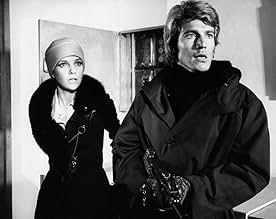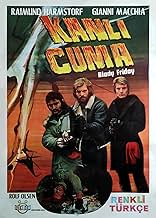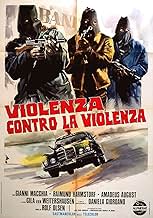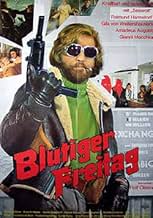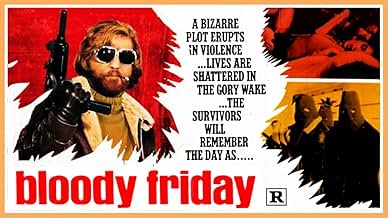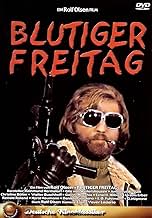Totò Mignone
- Franz Muhl
- (as Ottone Mignone)
Claudius Casagrande
- Niki
- (sin créditos)
Robert Furch
- Mann im Justizpalast
- (sin créditos)
Karin Glier
- Nickys Mutter
- (sin créditos)
Imo Heite
- Amerikanischer Soldat
- (sin créditos)
- Dirección
- Guionistas
- Todo el elenco y el equipo
- Producción, taquilla y más en IMDbPro
Opiniones destacadas
This is just a great, over the top story of a bank heist gone wrong with the greatest bad boy of movie history, Raimund Harmstorf. Chock full with (visual) violence, cheap FX and really the greatest trash talk of all times. And Gila von Weitershausen as the naive bit on the side isn't too bad either.
Womansing thug (Harmstorf) is sprung from the courthouse by two accomplices, then sets about planning the big heist of a local bank, equipped with a cache of high-powered weapons he's acquired from an American army outpost. Together with his faithful protégé (Macchia), who reluctantly on-boards his young girlfriend (Bohm) and her AWOL brother (August), the quartet bumble their way through the supposedly full-proof plan that aims to deliver them a cool million in cash and a new life in Australia. Predictably, things deteriorate quickly at every turn.
Harmstorf struts around in tight leather trousers, dropping C-bombs and picking fights he never wins with confidence and virility, an utterly repugnant and degenerate character. His internal adversary, the more even-tempered August character proves to be impotent to both the affections of one of the hostages, and to Harmstorf's increasing lunacy, remaining compliant in the hope of protecting his sister (Bohm) from harm. Generally the acting seemed pretty committed, although at times the atrocious dubbing makes it a mockery.
Paints a fairly miserable picture of working class Munich, often vulgar and violent, yet strangely engaging. The pitiful attempts by the gang to execute their plan, the constant set-backs, and Harmstorf's unbending belief that they'll all be free and filthy rich in spite of the escalating odds is worthy of the deepest sympathy. The climax was a bit disappointing but remained consistent with the overall tone, and while the jazz-pop soundtrack and dubbing will annoy some viewers, if you're not too picky, you might enjoy this quirky Bavarian bank robber flick.
Harmstorf struts around in tight leather trousers, dropping C-bombs and picking fights he never wins with confidence and virility, an utterly repugnant and degenerate character. His internal adversary, the more even-tempered August character proves to be impotent to both the affections of one of the hostages, and to Harmstorf's increasing lunacy, remaining compliant in the hope of protecting his sister (Bohm) from harm. Generally the acting seemed pretty committed, although at times the atrocious dubbing makes it a mockery.
Paints a fairly miserable picture of working class Munich, often vulgar and violent, yet strangely engaging. The pitiful attempts by the gang to execute their plan, the constant set-backs, and Harmstorf's unbending belief that they'll all be free and filthy rich in spite of the escalating odds is worthy of the deepest sympathy. The climax was a bit disappointing but remained consistent with the overall tone, and while the jazz-pop soundtrack and dubbing will annoy some viewers, if you're not too picky, you might enjoy this quirky Bavarian bank robber flick.
Heinz is a bit of a nutter. While heading to court, he manages to escape with the help of his mates and gives two policemen a severe beating for their troubles. Hunted nationwide, Heinz plans to rob a bank and start a new life in another country, with the help of his Italian mate and his girlfriend Helen, plus Helen's brother Christian, an AWOL soldier who is a last minute replacement for a guy who was captured during Heinz's escape.
Christian is reluctant to help and does so only to protect his sister, but he becomes more worried about the whole situation when Heinz starts displaying not-so-sane tendencies, including nearly murdering to American soldiers they were robbing for explosives. He goes ahead with the plan however, which turns out to be more complicated and dangerous than he thought, and things go wrong almost right away when a small child picks up a hand grenade that Heinz dropped on the way into the bank...
Okay, there's not much plot to be honest, but it's a good film nonetheless, mostly due to gigantic actor Raimund Harmstorf as the psychotic Heinz and his interactions with his hostages, plus his confidence that his plan is going to work, despite the self-evident truths. This is also a film that doesn't skimp on the violence, especially when a cop jumps on a hand grenade to protect the public. It's the goriest part of the film and something that was sure to shock audiences back in the day. Ah, the seventies.
Grim from beginning to end. What else can I say?
Christian is reluctant to help and does so only to protect his sister, but he becomes more worried about the whole situation when Heinz starts displaying not-so-sane tendencies, including nearly murdering to American soldiers they were robbing for explosives. He goes ahead with the plan however, which turns out to be more complicated and dangerous than he thought, and things go wrong almost right away when a small child picks up a hand grenade that Heinz dropped on the way into the bank...
Okay, there's not much plot to be honest, but it's a good film nonetheless, mostly due to gigantic actor Raimund Harmstorf as the psychotic Heinz and his interactions with his hostages, plus his confidence that his plan is going to work, despite the self-evident truths. This is also a film that doesn't skimp on the violence, especially when a cop jumps on a hand grenade to protect the public. It's the goriest part of the film and something that was sure to shock audiences back in the day. Ah, the seventies.
Grim from beginning to end. What else can I say?
If you consider the fact that the Italians, back in the seventies, were champions in the eurocrime exploitation genre (poliziotto), than it's no wonder they would have a go at it in other countries as well. Cineproduzione Daunia 70 (from Caliber 9) tried it in Germany with actor/director Rolf Olsen. He made the crime film Wenn es nacht wird auf der Reeperbahn in 1967, and the prostitution drama Der Pfarrer von St. Pauli in 1970, which are both quite good, so you understand why he wrote and directed it.
Bloody Friday is a more German version of the stylistic Italian poliziotto. It is tougher, more direct and also more over the top, I mean, it is sometimes TOO SILLY. The escape of Heinz Klett (great acting by Raimund Harmstorf by the way) on itself might be believable, but why would Heidi incriminate herself suddenly for her boyfriend Luigi, or would her brother do just the same for her? Just robbing a bank with a maniac, what can go wrong?
The heart of the film is this violent character Heinz. He is the cause of everything. How he bluntly accepts these amateurs for nothing less than a bank robbery, that's typical Heinz. He is like a caricature of a man, aggressive, sexist, opportunist and over confident. People who die just deserve it because they are weak, in his opinion.
Bloody Friday might look terrible at some point, but this film isn't as bad as it looks. It actually brings some surprising social undertones to the genre, which are usually lacking in poliziotteschi. The desperation from the other robbers give the film an humanistic context. Heidi and Luigi want to escape from their shitty jobs, while the brother is a deserter. It is also (very loosely) based on a real story, as Germany had to endure a lot of violence in this period – terrorism from extreme left wing organizations and violent bank robberies, not only by professionals, but also by amateurs, like in this film. I rate it 7/10.
Bloody Friday is a more German version of the stylistic Italian poliziotto. It is tougher, more direct and also more over the top, I mean, it is sometimes TOO SILLY. The escape of Heinz Klett (great acting by Raimund Harmstorf by the way) on itself might be believable, but why would Heidi incriminate herself suddenly for her boyfriend Luigi, or would her brother do just the same for her? Just robbing a bank with a maniac, what can go wrong?
The heart of the film is this violent character Heinz. He is the cause of everything. How he bluntly accepts these amateurs for nothing less than a bank robbery, that's typical Heinz. He is like a caricature of a man, aggressive, sexist, opportunist and over confident. People who die just deserve it because they are weak, in his opinion.
Bloody Friday might look terrible at some point, but this film isn't as bad as it looks. It actually brings some surprising social undertones to the genre, which are usually lacking in poliziotteschi. The desperation from the other robbers give the film an humanistic context. Heidi and Luigi want to escape from their shitty jobs, while the brother is a deserter. It is also (very loosely) based on a real story, as Germany had to endure a lot of violence in this period – terrorism from extreme left wing organizations and violent bank robberies, not only by professionals, but also by amateurs, like in this film. I rate it 7/10.
"Whatever they can do in Italy, we can do better" they must have thought in Germany. Extremely violent crime thrillers were very popular in Italy during the early 70's and at least a dozen of awesome ones got released every year. "Bloody Friday" is more or less Germany's response to this successful trend and a damn perplexing one, I may add! When the heavy criminal Heinz Klett escapes police custody during his transport to court, he promptly executes his plans to commit the biggest bank robbery ever in the history of the country. He, his regular partner and his girlfriend's brother storm into the bank heavily armed and take 10 people hostage. While the police attempts to gather the $1.000.000 ransom, and entire media circus unfolds outside on the streets. You usually know pretty much exactly how this kind of movie develops. Things don't go according to plan, there's the Stockholm Syndrome and a couple of unplanned deaths along the way. Apparently the film is inspired by similar real-life events as they occurred in Germany. I don't know which parts of the film were fictionalized, but I seriously wonder if the real events ended in such a nauseating and shocking bloodbath as well. I hope not. Probably the greatest accomplishment here is the biting social satire. While the hostage is going on inside, the public outside shouts for the re-implementation of the death penalty and there are even are some sly businessmen that unscrupulously want to make money out of the gathered crowd. It's certainly also not a film for people with an easily upset stomach or tangled nerves. Heinz' escape is bloody already and there's massively shocking sequence involving a hand grenade at the beginning of the hold-up. "Bloody Friday" is well-directed (by the guy who did "Shocking Asia"), the acting performances are pretty great and everything else (music, editing, photography, atmosphere) is simply in-your-face brutal and confronting.
¿Sabías que…?
- TriviaIn 2015, Subkultur Entertainment started a crowdfunding campaign via Kickstarter to restore the film which was successful. During the restoration it was discovered that the soundtrack was longer than the film itself. This resulted in raiding the vaults at the production company Lisa Film. There, a film reel was discovered which contained scenes cut to obtain a rating from the FSK. In the end, the original director's cut was restored in 4K resolution.
- Versiones alternativasGerman theatrical version was cut to secure a "Not under 18" rating. Only in 2017 the uncut version was released on DVD/Blu-ray.
Selecciones populares
Inicia sesión para calificar y agrega a la lista de videos para obtener recomendaciones personalizadas
Detalles
- Tiempo de ejecución
- 1h 34min(94 min)
- Relación de aspecto
- 1.66 : 1
Contribuir a esta página
Sugiere una edición o agrega el contenido que falta

